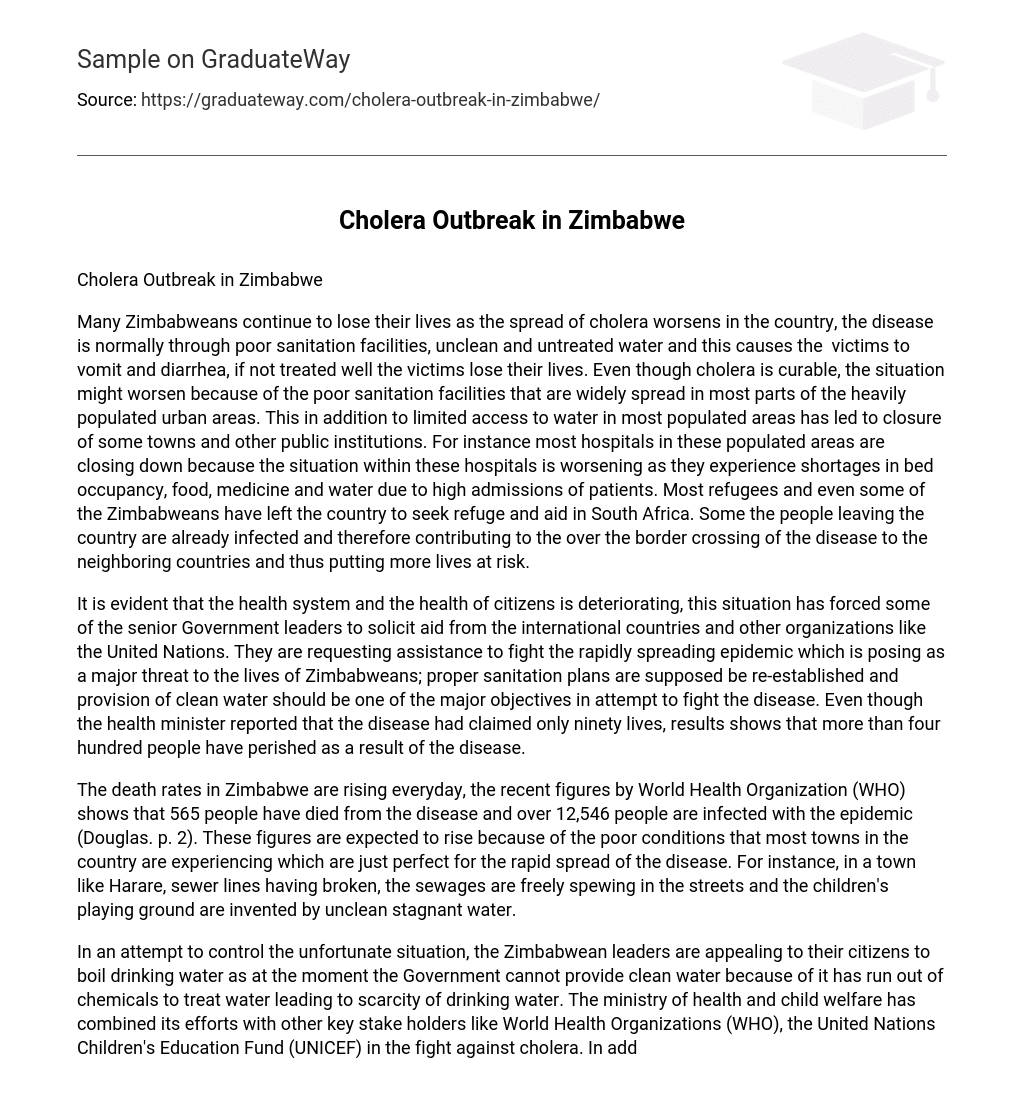Many Zimbabweans continue to lose their lives as the spread of cholera worsens in the country, the disease is normally through poor sanitation facilities, unclean and untreated water and this causes the victims to vomit and diarrhea, if not treated well the victims lose their lives. Even though cholera is curable, the situation might worsen because of the poor sanitation facilities that are widely spread in most parts of the heavily populated urban areas. This in addition to limited access to water in most populated areas has led to closure of some towns and other public institutions. For instance most hospitals in these populated areas are closing down because the situation within these hospitals is worsening as they experience shortages in bed occupancy, food, medicine and water due to high admissions of patients. Most refugees and even some of the Zimbabweans have left the country to seek refuge and aid in South Africa. Some the people leaving the country are already infected and therefore contributing to the over the border crossing of the disease to the neighboring countries and thus putting more lives at risk.
It is evident that the health system and the health of citizens is deteriorating, this situation has forced some of the senior Government leaders to solicit aid from the international countries and other organizations like the United Nations. They are requesting assistance to fight the rapidly spreading epidemic which is posing as a major threat to the lives of Zimbabweans; proper sanitation plans are supposed be re-established and provision of clean water should be one of the major objectives in attempt to fight the disease. Even though the health minister reported that the disease had claimed only ninety lives, results shows that more than four hundred people have perished as a result of the disease.
The death rates in Zimbabwe are rising everyday, the recent figures by World Health Organization (WHO) shows that 565 people have died from the disease and over 12,546 people are infected with the epidemic (Douglas. p. 2). These figures are expected to rise because of the poor conditions that most towns in the country are experiencing which are just perfect for the rapid spread of the disease. For instance, in a town like Harare, sewer lines having broken, the sewages are freely spewing in the streets and the children’s playing ground are invented by unclean stagnant water.
In an attempt to control the unfortunate situation, the Zimbabwean leaders are appealing to their citizens to boil drinking water as at the moment the Government cannot provide clean water because of it has run out of chemicals to treat water leading to scarcity of drinking water. The ministry of health and child welfare has combined its efforts with other key stake holders like World Health Organizations (WHO), the United Nations Children’s Education Fund (UNICEF) in the fight against cholera. In addition to this, WHO in an effort to cholera are also collaborating with the Government of South Africa to create re hydration facilities at and along the borders to accommodate new inhabitants that are fleeing Zimbabwe ( Scott, p. 3).
In an attempt to contain the outbreak of cholera, International organizations like Merlin (Medical relief, lasting health care) is negotiating with the ministry of health and child welfare in Zimbabwe to be granted access to the areas that are deeply affected by the epidemic.
In the early 1990s, cholera found its way in South America and spread to other parts through the people who ate unclean food from South America and traveled. In reaction to the outbreak, the United States installed modern sewage facilities and created more water treatment systems to make sure that the cholera situation is put under control indefinitely.
Most people in the United States, are infected with the epidemic through traveling in the cholera affected areas, other people acquires the epidemic when the consume sea foods that has not been well cooked or that has been undercooked (Boyce. p.35). Most of the people who travel are not tourists so once they are infected with the disease, contacting them and presenting them with prevention measures has proven unfruitful and this has contributed heavily on the spread of cholera epidemic in the United States.
The United States with other International health organizations usually investigates the outbreaks of cholera and comes up with the best possible measures to prevent the outcome again. The United States has also had its agencies supply medical facilities to the most affected countries and it is also working with the environmental protection agency to prevent the water from being contaminated with the bacterium. The US has also implemented rules that require Air planes to stock themselves with re hydration salts to prevent the infections and spread of the disease among passengers on board.
This devastating situation of cholera is similar to the one that was experienced when the world first learnt about HIV / AIDS. AIDS which is still considered as one of the major deadly diseases is still widespread all over the world. AIDS has continued to claim lives of millions of children every year as more than half of the infected children die at the age of two.
Unlike during the cholera outbreak, AIDS symptoms are not easily detectable, but to ensure a healthy living, one must go for testing which is normally free in most countries. This helps in further spread of the epidemic to the innocent uninfected people. Even though there is still no cure for AIDS, people living with AIDS can easily access life prolonging drugs.
References
Boyce T. G. Mintz ED, Greene K. D. Vibrio cholera 0139 Bengal infections among tourists to
South East Asia: an Intercontinental food borne outbreak. J. Infect Dis. 1995
Douglas R. Cholera outbreak in Zimbabwe .( 2008) Fox News Network
Scott B. Refugees flee Zimbabwe.(2008) .Johannesburg: print version





